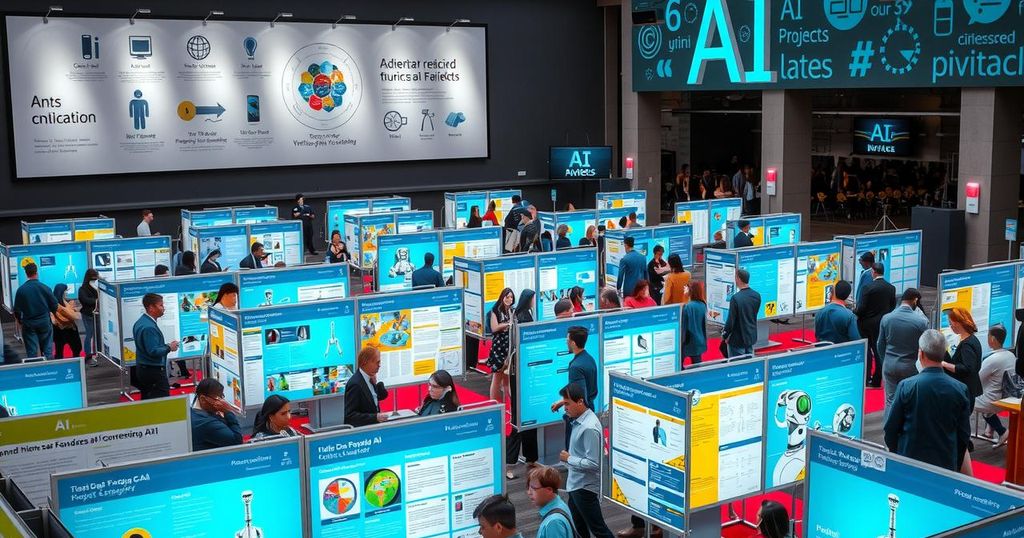Tech
COLLEGE OF, COLLEGE OF ENGINEERING, COLLEGE OF INFORMATION SCIENCES AND TECHNOLOGY, DEPARTMENT OF AGRICULTURAL AND BIOLOGICAL ENGINEERING, EDUCATION, KANGURI HAN, ME, OF AGRICULTURAL AND BIOLOGICAL ENGINEERING, PENN STATE, PENN STATE AI HUB, PENN STATE CENTER FOR IMMERSIVE EXPERIENCES, PENN STATE COLLEGE, PENN STATE COLLEGE OF AGRICULTURAL SCIENCES, PENN STATE INSTITUTE FOR COMPUTATIONAL AND DATA SCIENCES, PENN STATE UNIVERSITY, RESEARCH, SAM, SAMA, SCIENCE_TECHNOLOGY, STEM EDUCATION, TECHNOLOGY, TODD PRICE, UNIVERSITY, VENTURE CAPITAL
Amina Hassan
0 Comments
Penn State’s AI Week Celebrates Innovation and Collaboration in AI Research
Penn State’s AI Week, held from April 14-17, emphasized advancements in artificial intelligence research across education sectors. Students and faculty showcased their work through panels, workshops, and poster sessions, fostering collaboration. Highlights included notable student projects, K-12 educational initiatives, and the intersection of AI and the arts, all converging to create a vibrant AI community. For more information, visit the AI Hub website.
Penn State’s AI Week, a vibrant showcase of innovation and research, unfolded from April 14 to April 17, uniting faculty, students, and staff. Organized by the Penn State AI Hub, this annual event celebrated advancements in artificial intelligence, particularly in educational applications. Various activities including panels, immersive workshops, and poster sessions brought the community together to exchange ideas and promote collaboration.
According to Mehrdad Mahdavi, director of the AI Hub, AI Week aimed to strengthen the Penn State AI community. “We hope the events fostered conversations and new collaborations amongst researchers across Penn State,” he shared, emphasizing AI’s capabilities in research, career readiness, and education.
The student poster session was a highlight, showcasing over 60 projects ranging from AI-driven safety measures for all-terrain vehicles to algorithms for mushroom picking, and empathetic models for mental health. Impressive submissions came from both undergraduates and graduates, but six projects stood out, receiving accolades for their innovation.
Samarth Khanna, a second-year doctoral student, took first place with his work on fairness in large language models. His project, “Distributive Fairness in Large Language Models,” not only caught the judges’ eyes but inspired connections with fellow researchers. Kanguri Han and Suhas Bettapalli Nagaraj followed with second and third place respectively, each exploring impactful uses of AI in agriculture and mental health.
Nagaraj’s work is particularly noteworthy. He collaborates with Emory University on developing empathetic AI tools for mental health support, creating simulations and systems that can enhance therapy sessions. “It’s important that we make people more aware of AI’s capabilities and that it can be used for social good,” said Nagaraj, highlighting a crucial aspect of ethical AI use.
Panels during AI Week featured discussions on real-world applications of AI research including weather forecasting and improving infrastructure. “AI at Penn State is vibrant and growing,” noted Vijay Narayanan, CAFE director. The breadth of research showcased reflected a melting pot of ideas, and the engaged crowd underscored the community’s enthusiasm.
A unique aspect of AI Week was the emphasis on K-12 education. The Penn State Center for Science and the Schools organized workshops about promoting AI in classrooms and discussing AI policies. Jeff Remington, CSATS outreach liaison, expressed pride over its successful demonstration of AI’s impact in educational settings.
Art also played a significant role this year. Betsy Campbell from the College of Information Sciences and Technology designed activities that showcased AI intersections with the arts. One standout event was the “Post-human Performance” dance recital, where students programmed robots to perform dances alongside human participants. “Not many people understand AI,” remarked Gabe Selan, a student involved in the performance. “We were able to showcase what AI can do in a creative way.”
The excitement didn’t stop there, as the Nittany AI Alliance’s challenge awarded five student teams for developing impactful AI projects aimed at social good.
For those interested in delving deeper into AI Week’s activities, recorded sessions and additional resources can be found on the AI Hub website. This year’s event undoubtedly illuminated the potential of AI across disciplines and fostered a spirit of collaboration that promises to grow in the future.
In summary, Penn State’s AI Week successfully highlighted the dynamic research and applications of artificial intelligence within academia. From impressive student projects to impactful faculty discussions, the event fostered collaboration and awareness around AI’s potential benefits. Combining technical innovation with art showcased a multidimensional understanding of AI, paving new pathways for research and education. Overall, the spirit of community was palpable, setting the stage for future endeavors in this evolving field.
Original Source: www.psu.edu




Post Comment